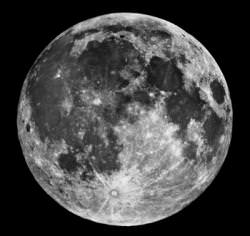 We take the Moon for granted, but its effect on the Earth is very important; possibly even critical for the formation of life. But where did it come from? Did the Earth and Moon form together? Or did the Earth capture a wayward Moon? Or was there a more catastrophic cause to this lunar mystery?
We take the Moon for granted, but its effect on the Earth is very important; possibly even critical for the formation of life. But where did it come from? Did the Earth and Moon form together? Or did the Earth capture a wayward Moon? Or was there a more catastrophic cause to this lunar mystery?
Continue reading “Podcast: Where Does the Moon Come From?”
What’s Up this Week: January 1 – January 7, 2007
Greetings, fellow SkyWatchers… Welcome to the new year and 365 more nights with you! Thanks to everyone for their kind words about the new edition and how great the softcover book turned out. The sky is at the limit as we begin 2007 exploring the Moon and keep on reaching for the stars. Now, let’s head out into the night because…
Here’s what’s up!
Continue reading “What’s Up this Week: January 1 – January 7, 2007”
Close Call with Asteroid 2006 XG1 in 2041
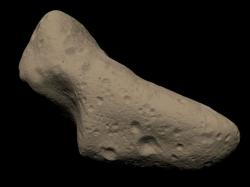 I don’t want to get you worried, or even mildly concerned. No need to panic. In fact, just read this little piece, and remark with interest that an asteroid is going to get really really close to the Earth on October 31, 2041. It might – I repeat might – have a small, insignificant chance of hitting the Earth and causing regional devastation. Like a 1 in 40,000 chance. Those are pretty good odds when you think of it.
I don’t want to get you worried, or even mildly concerned. No need to panic. In fact, just read this little piece, and remark with interest that an asteroid is going to get really really close to the Earth on October 31, 2041. It might – I repeat might – have a small, insignificant chance of hitting the Earth and causing regional devastation. Like a 1 in 40,000 chance. Those are pretty good odds when you think of it.
Continue reading “Close Call with Asteroid 2006 XG1 in 2041”
COROT is Blasted Into Space
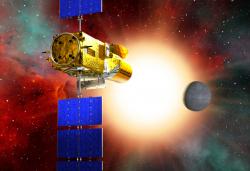 The debut launch of the Soyuz 2-1b rocket carried ESA’s COROT space telescope into orbit today. The rocket lifted off from the Baikonur Cosmodrome in Kazakstan at 1423 GMT (9:23 am EST). The Fregat upper stage successfully put the spacecraft into its final orbit about 50 minutes later.
The debut launch of the Soyuz 2-1b rocket carried ESA’s COROT space telescope into orbit today. The rocket lifted off from the Baikonur Cosmodrome in Kazakstan at 1423 GMT (9:23 am EST). The Fregat upper stage successfully put the spacecraft into its final orbit about 50 minutes later.
Continue reading “COROT is Blasted Into Space”
What’s Up this Week: December 25 – December 31, 2006
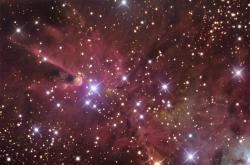 It’s a holiday week and even the stars are celebrating! Are you ready to join me in the last week of the 2006 observing season? Then head out into the night, because…
It’s a holiday week and even the stars are celebrating! Are you ready to join me in the last week of the 2006 observing season? Then head out into the night, because…
Here’s what’s up!
Continue reading “What’s Up this Week: December 25 – December 31, 2006”
Podcast: Across the Electromagnetic Spectrum
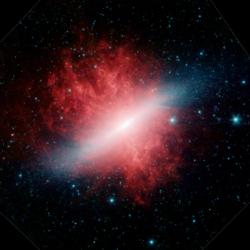 We see the Universe in visible light with our photon detecting eyes. We can feel infrared heat with our photon detecting hands, and we get sunburns with our ultraviolet photon detecting skin (ouch). But there’s a whole spectrum of photons out there, from radio waves to gamma rays that astronomers use to understand the Universe. It’s time to see the whole picture.
We see the Universe in visible light with our photon detecting eyes. We can feel infrared heat with our photon detecting hands, and we get sunburns with our ultraviolet photon detecting skin (ouch). But there’s a whole spectrum of photons out there, from radio waves to gamma rays that astronomers use to understand the Universe. It’s time to see the whole picture.
Continue reading “Podcast: Across the Electromagnetic Spectrum”
White Dwarf Recently Consumed an Asteroid
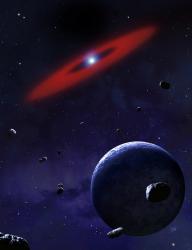 Astronomers have discovered a ring of metal-rich gas surrounding a relatively nearby white dwarf star that gives us a glimpse at the future of our own Solar System.
Astronomers have discovered a ring of metal-rich gas surrounding a relatively nearby white dwarf star that gives us a glimpse at the future of our own Solar System.
Continue reading “White Dwarf Recently Consumed an Asteroid”
Use Galactic Gravitational Lenses to Really See the Universe
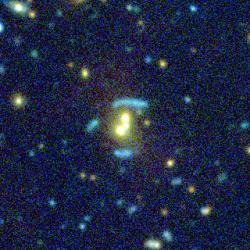 To see any distance in space, you need some kind of telescope. We’ve got some pretty powerful ones here on Earth, but nature has us beat with gravitational lenses. This is a phenomenon when a relatively nearby object passes directly between us and a more distant object. The gravity from the nearby object acts as like a telescope lens to bend light and magnify the more distant object.
To see any distance in space, you need some kind of telescope. We’ve got some pretty powerful ones here on Earth, but nature has us beat with gravitational lenses. This is a phenomenon when a relatively nearby object passes directly between us and a more distant object. The gravity from the nearby object acts as like a telescope lens to bend light and magnify the more distant object.
Continue reading “Use Galactic Gravitational Lenses to Really See the Universe”
Insanely High Resolution Photo of the Tarantula Nebula
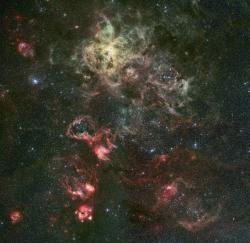 I’m not sure why, but the European Southern Observatory has decided to give their web servers and bandwidth a real workout with their latest photo release. But I’m glad they did.
I’m not sure why, but the European Southern Observatory has decided to give their web servers and bandwidth a real workout with their latest photo release. But I’m glad they did.
Continue reading “Insanely High Resolution Photo of the Tarantula Nebula”
Early Images of the Sun From Hinode
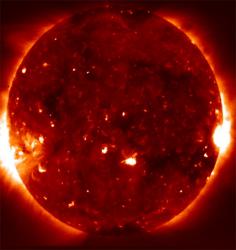 The recently launched Japanese Hinode spacecraft is turning in some amazing new photographs of the Sun as part of its checkout phase.
The recently launched Japanese Hinode spacecraft is turning in some amazing new photographs of the Sun as part of its checkout phase.
